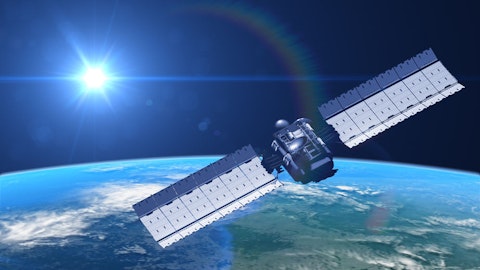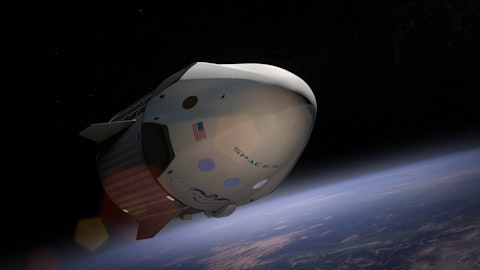Ashley Fieglein Johnson: As you may remember, our data subscription model is such that our direct margins on our core products are already quite high in the mid-’90s as it is. So, our primary expenses relate to our hosting costs which are predictable and then the depreciation of the satellites. So, there’s — as we…
Greg Mesniaeff: No, there is no. So, what you’re saying is this — I guess what you’re saying is there is not much of a tailwind left there given the high margin profile already, you’re seeing.
Ashley Fieglein Johnson: I guess what I’d say is, from a gross margin perspective, revenue for us as a tailwind because the direct margins are so high. So, and, as we increase our share of wallet with customers by selling more analytics that is a tailwind because that revenue has also very high gross margin.
Greg Mesniaeff: Thank you.
Operator: Thank you, Mr. Mesniaef. Our last question will be from the line of Josh Sullivan with The Benchmark Company. You may proceed.
Josh Sullivan: Good afternoon. We’re just given where macros sales cycles that you guys are seeing capital markets are currently do you think we see a consolidation cycle space AI and thus Planet have an appetite to be that consolidator?
Will Marshall: Well, we’ve already talked about the fact that we kind of as a natural consolidator in this space in general I’d say we’re more focused on going up the value stack them, and then the Aerospace side of API we’ll always be disciplined and thinking about the return on investment on that sort of move. But yeah, I mean and data businesses in general, just stepping back and think about us and we think about ourselves more as the data business and our satellite business and as data business, they tend to be very powerful when they have more rare, but they have extremely high lock-in and high hard to displace when they come about and so, I think there is a natural situation for consolidation. And yeah, we think that we could, and in a position of strength to do that in time.
Josh Sullivan: And then just one question on the solar intensity impact of the two satellites. Why wouldn’t just have a broader — on a console maybe what’s the probability we see, additional Canadian accelerated depreciation and as that solar activity decreased at this point to reduce the risk?
Will Marshall: No. It hasn’t changed, it’s still high and still elevated. We’re you asking, the effects of the fleet? I think — understand…
Josh Sullivan: Yes. Just understanding if the activity — the solar activity is still high, is there still a risk that we might the other satellites in the council impacted by this dynamic?
Will Marshall: Well, no. Now, we’ve taken into account the difference this is now made. So, we can forecast that but yeah, it is an unusual situation and — but remember that our fleet is highly redundant. And one of the reasons that we are able to survive this sort of situation is we have a lot of redundancy in our fleet. And then, also we continue to make operational improvements in that. So, we’re not worried about being able to continue to provide to our customers. And so, yeah, we feel good about our ability to continue to this.
Josh Sullivan: Okay, thank you, Will.
Ashley Fieglein Johnson: Okay.
Operator: Thank you, Mr. Sullivan. That is all the time we have for the question-and-answer session. So, I will now turn the call back over to Will Marshall, Co-Founder and CEO for any further remarks.





